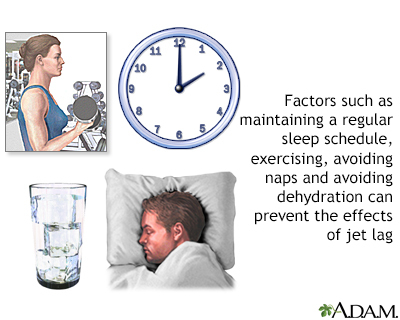Jet lag disorder
Definition
Jet lag is a temporary sleep disorder. It occurs when your body's biological clock is not in sync with the local time zone you are in. The more time zones you pass through, the worse your jet lag can be. Also, traveling east can be harder to adjust to because you lose time.
Jet lag can make you feel like going to bed several hours before bedtime. You also may have trouble falling asleep, feel tired during the day, feel confused and out of sorts, and generally not feel well.
There are steps you can take to help prevent jet lag, such as trying to adjust to the new time zone before you arrive.
Gallery

References
Bezruchka SA. Disequilibrium: jet lag, motion sickness, cold exposure and heat illness. In: Sanford CA, Pottinger PS, Jong EC, eds. Travel and Tropical Medicine Manual, The. 5th ed. Philadelphia, PA: Elsevier; 2017:chap 9.
Drake CL, Wright KP. Shift work, shift-work disorder, and jet lag. In: Kryger M, Roth T, Dement WC, eds. Principles and Practice of Sleep Medicine. 6th ed. Philadelphia, PA: Elsevier; 2017:chap 75.